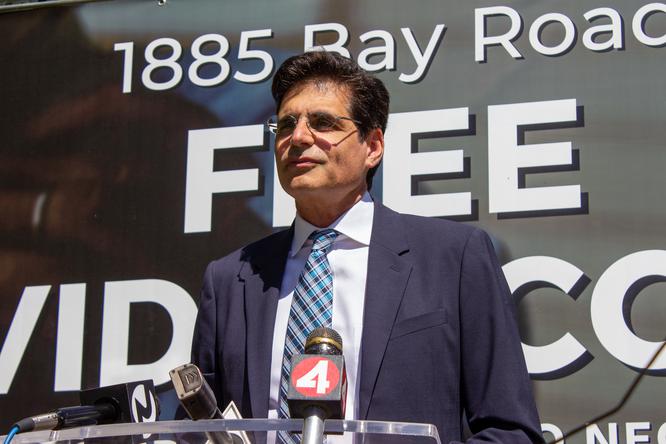State Senate Bill 1000, which would require law enforcement agencies to find alternatives to encrypted radios, was advanced by the Senate Public Safety Committee on April 19, 2022. Embarcadero Media file photo.
A bill authored by Sen. Josh Becker, D-Menlo Park, that would require law enforcement agencies throughout California to find alternatives to encrypting their radio communications cleared its first hurdle Tuesday when the Senate Public Safety Committee voted to advance the legislation.

State Sen. Josh Becker, D-Menlo Park, speaks during a press conference in Palo Alto on March 2, 2021. Photo by Magali Gauthier.
Becker's legislation, Senate Bill 1000, responds to a recent trend of police departments throughout the state moving to encrypted radio communications, a switch that makes it impossible for journalists and other residents to monitor police activities. Palo Alto, which switched to an encrypted channel in January 2021, was among the early adopters. Almost every other police department in Santa Clara County has since made the switch.
Becker's bill aims to reverse the trend and force law enforcement agencies to find alternatives to encrypted radios. If approved by the Legislature and signed into law, police departments would have to adopt policies that allow radio communications to be monitored while protecting personally identifiable information such as Social Security numbers, driver's license numbers and criminal records of individuals.
Like other departments, Palo Alto police said their switch to encryption was prompted by an October 2020 directive from the state Department of Justice requiring all police agencies that rely on the California Law Enforcement Telecommunications System (CLETS), a database used by law enforcement agencies across the state, to protect personal information. Under the directive, agencies were allowed to do so either by encrypting their radio communications or by adopting policies that protect the personal information, which could mean relaying this information by cellphone, computer or other means.
At a hearing Monday, Becker said that his bill is consistent with that order because it will require law enforcement agencies to protect personally identifiable information, as required by the Department of Justice. He argued, however, that full encryption is both unnecessary and harmful when it comes to protecting the residents' right to know what is happening in their communities.









